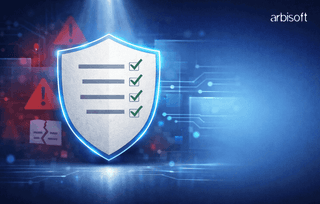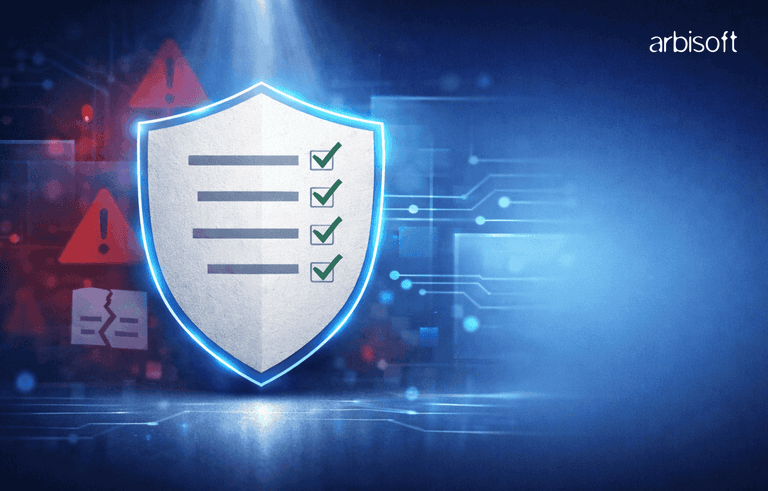We put excellence, value and quality above all - and it shows




A Technology Partnership That Goes Beyond Code

“Arbisoft has been my most trusted technology partner for now over 15 years. Arbisoft has very unique methods of recruiting and training, and the results demonstrate that. They have great teams, great positive attitudes and great communication.”
From Disruption to Innovation: How Businesses Can Turn Disruptive Technologies into Opportunities

Consider this: by 2025, over 50% of the global economy is expected to be influenced by digital platforms and ecosystems powered by these disruptive technologies. The speed at which these changes are occurring underscores the urgent need for businesses to adapt. Yet, rather than seeing disruption as a threat, forward-thinking companies are embracing it as a catalyst for innovation, leveraging these technologies to secure a competitive edge in the evolving market landscape.
Disruptive technologies such as artificial intelligence, blockchain, 5G, and quantum computing, are innovations that fundamentally alter the way businesses operate. They often displace established technologies, create new markets, and force companies to rethink their strategies. These technologies, though often viewed with apprehension due to their potential to upend traditional business models, also offer unparalleled opportunities for growth and innovation. But first, what is disruptive innovation?
Uncovering Disruptive Innovation
Disruptive innovation is a concept that describes how new technologies, products, or services can start on a small scale but eventually surpass established market leaders. This theory was made famous by Clayton Christensen, a professor at Harvard Business School and a frequent contributor to the Harvard Business Review.
Disruptive innovation has two main aspects:
- New market disruption happens when a product or service taps into previously underserved markets or attracts new customers who were not considered before. This often involves targeting profitable segments and expanding into higher-end customer groups.
- Low-end disruption offers a more affordable or simpler alternative to existing products, appealing to mainstream or cost-conscious consumers at the lower end of the market.
In contrast, sustaining innovation focuses on making gradual improvements to existing products to better serve current customers and maintain market leadership.
Is your business ready for the disruptions that lie ahead? Take the quiz to find out!

Assess your readiness for disruptive technologies with our quick quiz.

Seeing Disruptive Technologies as Opportunities
Disruptive technologies such as artificial intelligence (AI), blockchain, and 5G often instill fear in businesses due to their potential to upend traditional models. However, these technologies also offer new avenues for growth and innovation, enabling companies to rethink how they operate. Let’s explore how businesses can harness these technologies as opportunities:
1. Rethinking Business Models
Disruptive technologies compel businesses to reassess their existing models. A notable example is Netflix. When faced with a decline in DVD rentals, Netflix pivoted to a streaming model. This transition not only ensured Netflix's survival but also allowed it to dominate the global entertainment industry. Similarly, businesses today must evaluate whether their traditional models are sustainable in the face of emerging technologies and consider adopting more flexible, tech-driven approaches.
2. Improving Customer Experience
Advanced technologies equip businesses with tools to significantly enhance customer interactions. AI-driven systems can analyze customer data to offer personalized experiences, while IoT devices provide real-time updates that keep customers informed. For instance, the retail industry has seen a surge in AI-powered chatbots that deliver instant customer service, reducing response times and increasing satisfaction. By integrating ecommerce chatbot solutions businesses can streamline customer service and personalize experiences, building stronger relationships with their customers and foster loyalty.
3. Entering New Markets
Disruptive technologies often give rise to new markets or transform existing ones. Businesses that stay attuned to these developments can seize new opportunities before their competitors. The rise of e-commerce during the COVID-19 pandemic is a prime example, as traditional brick-and-mortar stores quickly embraced online retail. By being proactive, businesses can position themselves as leaders in emerging markets.
Strategies for Business Leaders
Handling technological disruption effectively requires business leaders to be both proactive and strategic. Here are key strategies for navigating these challenges:
1. Invest in Continuous Learning
In a rapidly evolving technological landscape, staying informed about the latest trends is crucial. Business leaders should regularly attend industry conferences, engage in webinars, and foster a culture of continuous learning within their teams. Continuous education enables leaders to make informed decisions about adopting new technologies and preparing their businesses for future disruptions.
2. Encourage Innovation
A culture of innovation is essential for thriving amid disruption. Leaders should create an environment where employees feel empowered to experiment with new ideas and technologies. Google, for example, encourages employees to dedicate a portion of their time to personal projects, leading to significant innovations like Gmail. Fostering such creativity can result in groundbreaking products or services that provide a competitive edge.
3. Form Strategic Partnerships
Collaborating with startups or tech innovators allows established businesses to access the latest technologies and ideas. These partnerships help companies stay relevant and quickly adapt to market changes. For example, many large corporations have formed alliances with fintech startups to integrate cutting-edge payment solutions into their platforms, enhancing customer experiences and staying competitive in the digital age.
4. Leverage Data Analytics
In today’s data-driven world, using analytics to monitor market trends and customer behavior is critical. By integrating predictive analytics solutions, businesses can not only analyze current data but also forecast future trends, enabling them to anticipate changes and adjust their strategies accordingly. Amazon, for instance, uses advanced analytics to track customer preferences and optimize their supply chains, ensuring they can meet demand efficiently. By leveraging data, businesses can make informed decisions that keep them ahead of the competition.
Companies That Successfully Pivoted
Several companies have turned potential disruptions into opportunities by successfully pivoting their business models. These examples illustrate how adapting to technological change can lead to sustained success:
Amazon
Amazon has changed the way we shop by creating an online store that’s convenient and customer-focused, making traditional stores rethink how they do business.
- Online Shopping: Amazon’s website lets people easily find and buy almost anything from the comfort of their homes, giving traditional stores some serious competition.
- Convenience and Price: With great prices, personalized recommendations, and easy delivery, Amazon keeps winning over more customers.
- Fast Delivery: Amazon Prime offers super-fast, free shipping, setting a new standard for quick and reliable delivery.
What Others Can Learn:
Businesses can learn from Amazon by building an easy-to-use online store, focusing on customer needs, offering good prices, and ensuring fast, reliable delivery to stay ahead in the game.
Apple
Apple has completely changed the tech world, creating products that have transformed how we talk to each other, enjoy entertainment, and use technology every day. Their innovations have set new standards and raised the bar for what people expect from their devices.
- iPhone: Apple revolutionized the smartphone market by combining a beautiful design, an easy-to-use interface, and a variety of features into one device.
- iPad: The iPad redefined tablets with its large touchscreen, powerful performance, and flexibility for work, fun, and creativity. It’s also made a huge difference in education, changing the way students learn with digital tools.
- Apple Watch: Apple took wearable tech to a new level with the Apple Watch, which blends fitness tracking, notifications, and apps into a sleek device you can wear every day.
- Everything Works Together: The Apple Watch shows how well Apple’s products connect with each other. By syncing with other Apple devices and services like iCloud and Apple Music, it creates a smooth, hassle-free experience for users.
What Others Can Learn:
Apple’s success shows the importance of keeping things simple, which is a big part of why their products are so user-friendly, even for those who aren’t tech-savvy. They’ve also built a loyal community of users who feel connected to the brand, often seeing themselves as part of something special. This strong sense of community is a powerful lesson for any business.
Additionally, the passion Apple’s team has for their work is clear in every aspect of their products, from design to marketing. Finally, Apple’s willingness to embrace change and adapt their products and services to meet evolving customer needs is a key reason they continue to lead the industry.
Uber
Uber has made getting a ride as simple as tapping a button on your phone, challenging traditional taxi services and changing the way we think about transportation.
- Easy App Access: Uber’s app lets users quickly request a ride with just a few taps.
- Flexible Workforce: Uber’s model of using drivers with their own cars made it easy to grow and offer rides everywhere.
- Flexible Pricing: Uber’s dynamic pricing adjusts costs based on demand, ensuring rides are available when needed and giving riders the choice to pay more during peak times.
What Others Can Learn:
Uber’s success highlights the importance of using technology to make life easier for customers, being adaptable, and always focusing on customer satisfaction.
Netflix
Netflix has transformed how we watch TV and movies by moving from DVD rentals to streaming, offering endless entertainment at our fingertips.
- Stream Anytime: Netflix lets viewers watch what they want, when they want, without the hassle of physical DVDs.
- Original Shows and Movies: By creating its own content, Netflix attracted a loyal fan base with exclusive shows and movies.
- Personalized Picks: Netflix’s smart recommendations help users discover new content they’ll love, making the viewing experience more personal and enjoyable.
What Others Can Learn:
Netflix’s journey shows the power of embracing change, focusing on the customer experience, and using data to deliver a personalized product that keeps people coming back.
Emerging Disruptive Technologies
As we look to the future, several emerging technologies are poised to further disrupt industries. Understanding these technologies and their potential impact is crucial for businesses looking to stay ahead:
1. Quantum Computing
Quantum computing is set to revolutionize industries by solving complex problems that traditional computers can’t handle. For example, pharmaceutical companies like Pfizer are exploring quantum computing to simulate molecular interactions, potentially reducing the time it takes to develop new drugs.
2. 5G Networks
The rollout of 5G promises faster, more reliable internet connections, enabling innovations in smart cities, autonomous vehicles, and the Internet of Things (IoT). Tesla is leveraging 5G technology to enhance the performance of its self-driving cars, allowing for faster data transmission and improved safety and efficiency.
3. Blockchain Technology
Beyond cryptocurrencies, blockchain offers secure and transparent ways to manage transactions and data. Walmart, for instance, uses blockchain to track the journey of food from farm to table, increasing transparency and reducing contamination risks. This technology helps manage supply chains more effectively and builds consumer trust.
4. Nanotechnology
Nanotechnology is making significant impacts in industries like healthcare, manufacturing, and electronics by manipulating matter at the molecular level. Companies like Nanospectra Biosciences use nanotechnology to develop treatments that target and destroy tumors with minimal damage to surrounding tissues.
5. 3D Printing
3D printing allows businesses to create complex objects quickly and cost-effectively, revolutionizing industries like manufacturing and healthcare. SpaceX, for example, uses 3D printing to produce rocket components, significantly reducing manufacturing costs and speeding up development.
6. Smart Cities
Smart cities utilize IoT, AI, and big data to improve urban infrastructure, making cities more efficient and livable. Barcelona, for example, has implemented smart traffic management systems that reduce congestion and smart waste management systems that optimize collection routes, saving the city millions annually.
7. Augmented Reality (AR) and Virtual Reality (VR)
AR and VR are transforming how we interact with the world, offering new opportunities in retail, education, and entertainment. IKEA’s AR app, for instance, allows customers to visualize how furniture would look in their homes before making a purchase, enhancing the shopping experience and reducing returns.
8. Artificial Intelligence (AI) and Machine Learning (ML)
AI and ML are driving automation and efficiency across industries, from optimizing processes to enhancing customer experiences. Google, for example, uses AI to power its search engine, delivering more relevant results to users. In retail, companies like Amazon use AI to suggest products that customers are likely to buy, increasing sales and improving the shopping experience.
Turning Disruption into Success
Disruptive technologies don’t have to be a threat. By viewing them as opportunities, businesses can innovate, adapt, and thrive. Staying informed, fostering a culture of innovation, and strategically leveraging new technologies can help companies not only survive but succeed in a rapidly changing world. As the business landscape evolves, those who embrace disruption will be best positioned to lead the way into the future.
























